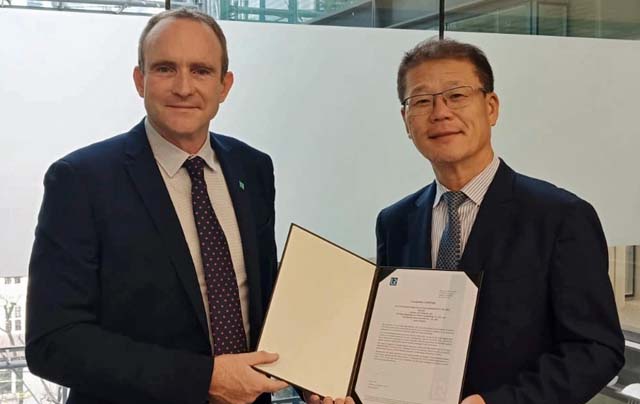Alternative fuels, green steel and renewable energy are fundamental to greenhouse gas (GHG) emissions reduction during the life cycle of a vessel, according a study carried out by a Lloyd’s Register (LR), Knutsen, HDKSOE and HHI Joint Development Project (JDP).
The six-month study, which began in June 2023, calculated the carbon emissions generated throughout the entire life cycle of a 174,000m3 newbuild LNG Carrier, from cradle (raw material extraction) to gate (shipbuilding), gate to end-of-life (operation), and end-of-life and to grave (demolition, recycling, and waste disposal).
Research carried out as part of the joint development project (JDP) reveals the majority of emissions are created during the operational period of a vessel’s life cycle, but that these can be reduced by around 90% through the use of zero- or low-carbon fuels. Of the overall operations figure, 79% of GHG emissions are generated through ship operations (tank-to-wake), with 21% attributed to mining and transport (well-to-tank) of the fuels, highlighting the significant positive impact of low- or zero-carbon fuels on emissions reduction.
The study reveals that GHG emissions during the shipbuilding stage (gate) can be significantly reduced if green steel – steel with low or zero GHG emissions embodied at the manufacturing stage – is introduced into the process. The use of renewable energy could lead to a GHG emissions reduction of around 60% at the yard level.
The study takes into account all emissions (scope 1, 2 and 3) associated with the vessel throughout its life cycle. Scope 1 emissions are the direct emissions created during shipbuilding and operation. Scope 2 emissions are indirect emissions related to energy, water and steam, for example powering the yard during the build. Scope 3 emissions encompass indirect emissions created both upstream (supply chain) and downstream (distribution chain), for example, emissions created during production, transport and storage of materials and equipment, and during the vessel recycling process. By incorporating all three scopes a complete emissions profile over a vessel’s life cycle can be obtained.
LR CCO Andy McKeran said: “Lloyd’s Register is delighted to be part of this JDP study, which is an industry first for shipping. The IMO regulations are progressively evolving to encompass the entire value chain and Scope 3 emissions disclosures are gaining traction. The methodology created and tested as part of the study will provide a baseline for all life stages of a new construction vessel and serve as a benchmark for comparing the life cycle emissions of other LNG carriers. LR is seeing strong demand for LCA assessment, with leading shipowners keen to identify the most impactful measures to reduce their environmental footprint, and charterers looking to minimise their Scope 3 emissions.”
Knutsen Director of Newbuilding and Innovation, Jarle Østenstad, said: “We are delighted to announce that our collaboration with HDKSOE and LR has yielded significant results in the Life Cycle Assessment (LCA) of the LNG-fuelled LNG carrier. In preparation for the forthcoming EU Corporate Social Responsibility Directive (CSRD), and other similar regulations across the globe, ship owners will be required to produce sustainability reports disclosing their Scope 3 emissions and outline strategies for mitigation. This LCA analysis brings owners one step closer to meeting these requirements.”
HDKSOE and HHI Senior MD Yong-Hwa Yeo said: “We are pleased to have obtained significant outcomes from the LCA of the LNG-fuelled LNG carrier through our collaboration with Knutsen and LR. Drawing from the insights of this Life Cycle Assessment study, we will continue to explore measures for mitigating greenhouse gas emissions throughout the entire value chain. Particularly, it underlines the imperative need for technological readiness in transitioning to low and zero-carbon fuel alternatives for ships. Expanding on this LCA expertise, we will expand the Life Cycle Assessment to cover all our key flagship products, enabling us to more transparently communicate the environmental impacts of our products with the stakeholders.”
Image: LR and HHI life-cycle study (source: Lloyd’s Register)



